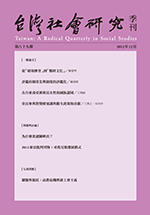
《台灣社會研究季刊》 第89期:

從「昭和摩登」到「戰時文化」:〈趙夫人的戲畫〉中大眾文學現象的觀察與省思/柳書琴 (89民國101.12頁01-45)
日治時代臺灣各種現代知識或概念的傳播途徑中,傳播力最大、影響結果也最難以評估的一種即是大眾讀物。本文企圖以龍瑛宗(1910-1999)為案例,觀察一位純文學中堅作家對大眾文學元素的援用,分析這種策略出現的背景與必要性。龍瑛宗選擇了特殊的形式,獨特的角度,也選擇了一個特別的年代。〈趙夫人的戲畫〉成功捕捉了時代轉換期裡大眾文化在殖民地盛極將衰的片段,也傳達了作者對當時讀書市場及閱讀現象的批評。本文首先將分析這部具形式實驗意圖的反諷小說,如何透過雙層敘事、多角敘事和輕質感風格構成獨特形式?其次,探討它如何透過大眾文學元素的引入、中間色彩的營造,嘗試現實主義文學的虛構化?第三,探討它如何透過讀者閱讀反應的類型,描繪當時大眾文學盛行的現象,以及這種現象對女性教養及社會價值傾向產生的影響?第四,介紹龍瑛宗對於流行文化將衰、戰爭文化正起之文化轉換期的時代風景捕捉;第五,歸納他對日本大眾讀物影響殖民地讀書市場此一現象的整體觀察和省思,以及他透由大眾小說議題所欲傳達的殖民文化批判觀點。
關鍵字:龍瑛宗、〈趙夫人的戲畫〉、大眾文學、閱讀反應、女性讀者
In Japanese colonial time, among various means of the communication of modern knowledge and concepts, popular readings was the most powerful medium, but it was also the most difficult to evaluate its influence. This study attempts to take Long Ying-tsung(1910-1999) as an example, analyzing the background and necessity of the use of mass literature by observing an important pure literature writer’s application of mass literature. Long chooses a special method, a unique angle, and an extraordinary period of time.“Madame Chou’s Giguwa” successfully captures fragments of the time of transformation when mass literature throve to the utmost and was going to decline in the colony. It also conveys the author’s criticism on the reading market and the reader responses at that time. This paper will first analyze how, with formal experiment intention, this ironic novel constructs its unique form through double-layer narratives, multi-perspectives narratives, and a light texture style. Second, it will explore how this novel experiments on the fictionalization of realism by the introduction of the elements of mass literature and the building of intermediate colors. Third, it will discuss how it depicts the prospering phenomenon of mass literature through the description of the reader’s response, and what impact this phenomenon has on women’s parenting and social value orientation. Fourth and fifth, it will induce the author’s reflection upon the reading market in Taiwan and other related social and cultural phenomena in the transformation period when popular culture was about to decline and wartime culture was rising.
Keywords:Long Ying-tsung, “madame chou’s giguwa”, mass literature, reader response, women readers
大稻埕異托邦:百年城市史裡的「福科問題」與文化閒逛評鑑的制度化與制度的評鑑化:一個以台灣社會學者為對象的研究/蘇碩斌(89民國101.12頁47-82)
本文論證2006年至2011年間大學學風出現轉變,且與教育部委託高教評鑑中心進行的系所評鑑有關。研究以社會學相關教師為對象進行,透過數十人次的焦點團體及個別訪談,應用新制度理論的觀點,勾勒系所評鑑由單一活動成為完整制度的過程。研究發現,源自新自由主義精神、講求可課責性的系所評鑑,一方面委由學界進行同儕主觀性的自主審查,一方面則由中心協助建置客觀性的效標,成為目的曖昧但流程嚴格的「制度化的評鑑」。制度化評鑑的客觀計分指標,再被大學複製成為內部教師評鑑的準則,並將教學研究的內涵化約為全面性、定期性、數量性的評比獎懲,成為「評鑑化的制度」。這個過程形塑了新的制度性環境,迫使教研人員放棄傳統師生倫理的教育理念,轉而追求具有制度正當性的出版績效。
關鍵字:系所評鑑、制度、社會學家、新制度理論
This paper argued that changes in the academic climate from 2006 to 2011 was related to the “Program Evaluation” to the universities in Taiwan, which was commissioned by the Ministry of Education and executed by the Higher Education Evaluation & Accreditation Council of Taiwan. This study interviewed 23 sociology-related faculties (through focus groups and individual interviews) as research objects, and used Neo-institutionalism theory to figure out how the Program Evaluation event transformed into a austere institution. This research found that the Program Evaluation, which was at first based on neo-liberalist concept of “accountability”, on the one hand invited the professional scholars as subjective peer reviewer, on the other hand built a set of objective index to guide the professional. As a result, an “institutionalized evaluation” emerged, with ambiguous ends and clear-cut means. The institutionalized evaluation with objective scoring indexes then was be copied into the universities’ internal review institution to evaluate their teachers. As a result, an “evaluationalized institution” emerged with comprehensive, regular, and quantitative rating sanctions. This formation process of a new institutional environment forced the faculty to pursue the specific publication efficiency instead of following the traditional teacher-pupil ethics.
Keywords:program evaluation, institution, sociology faculty, Neo-institutionalism
曖昧的歸屬,策略性的協商:在台東南亞新移民女性的國族認同/王翊涵 (89民國101.12頁83-125)
認同一直是台灣學術研究新移民女性現象時被忽略的一環,本文在國族認同的議題下,探討東南亞新移民女性跨海結婚來台以後的形構樣貌。相關文獻已指出環境裡的權力運作與個體認同之間的息息相關,特別是女性常在國族建構裡被賦予邊界標誌,女性移民更易承接來自接待社會對原生國家強加的標誌烙印。台灣社會對於新移民女性「排她」地刻畫國族界線,生活於此脈絡中,這群女性將形構出怎樣的國族認同?透過深入訪談18 位新移民女性,本文發現她們來台以後都多少經驗著「排她」,不過「與原生家庭的情感連結」、「既嫁從夫」、「成為母親」以及「移動前後情境交錯」有著重要的影響力,她們的國族認同因此是在台灣與母國的跨國座標裡定義參照,多數形構出「我是台灣人,我也是越南/印尼/柬埔寨人」的認同,甚至有「我要做台灣人,我不要當柬埔寨人」的歸類。但是「排她」經驗難以抹滅,「我是印尼人,不是台灣人」的類型因而產生,「認同台灣」與「認同母國」也在「排她」的脈絡下被視為是種政治性的協商策略。本文研究成果不僅助於了解東南亞新移民女性在「認同/不認同」「台灣/母國」裡既曖昧又協商的國族認同面貌,亦指出歸化國籍與產生國族認同之間非等號的關係,更期能對台灣的同化論述與國族優越宣稱提出反省意義。
關鍵字:新移民女性、國族認同、國族界線、認同協商
This article explores national identification of Southeast-Asian women who migrated into Taiwan by marriage. It has been demonstrated that the identification of the individual is closely linked to structural power. Feminist scholarship also reveals ways in which idealized images and real bodies of women serve as national boundaries; accordingly immigrant women are more easily stigmatized in the host country. Taiwanese society portrays Southeast- Asian immigrant wives as “problem-makers”; thus, this article mainly asks how these women can define themselves and construct a sense of belonging after marrying into Taiwan. Based on in-depth interviews, I first address that these immigrant wives’ national identification is multiply, ambiguously, resistantly and politically (re)defined not only within transnational fields (that is, ties with homeland, mothering experiences in Taiwan, and living conditions before and after migration), but also by discriminatory gaze in Taiwan that regards them as “outsiders”. It is also found that having Taiwanese citizenship unlikely draws forth immigrant wives’ Taiwanese identity. These research results remind “superior Taiwan” of self-examination.
Keywords:immigrant wives, national identification, national boundaries, identity negotiation
常民參與對醫療知識與衛生政策的貢獻:職業病認定與補償之爭議的歷史分析/王實之、吳怡伶 (89民國101.12頁127-184)
本文論證在公共衛生的範疇中,「常民參與」對醫療科學知識及衛生政策的貢獻,特別以台灣工人運動對職業病議題的參與經驗為例,說明職業病的社會建構特性。職業病問題有其特殊社會意涵,西方歷史經驗指出,工人以「社會參與模式」同時對疾病知識的建構與相關政策進行改革:除了疾病的發現之外,在認定和補償的爭議中,工人對生物醫學知識為典範的「科學/專家主義」模式提出質疑和挑戰,進而主張常民流行病學的觀點,且透過集體的行動督促補償制度的逐步改善。透過檢視三個頗具代表性的工人集體爭取職業病補償案例,本文呈現社會參與模式在台灣的幾個特性:包括常民發現、集體行動的產生、職業病認定的爭議、制度的改革。最後,本文強調常民流行病學與工人運動,在職業病的知識發展和相關衛生政策改革上,扮演不可或缺的角色。
關鍵字:醫療知識的社會建構、社會參與模式、常民流行病學、工人運動、職業病認定與補償
This paper demonstrates the contributions of ‘lay participation’ to the knowledge of medical science and health policy. By taking the example of workers’ movement on the issues of occupational disease in Taiwan, this paper illustrates the social construction of occupation diseases. The specific social implication of occupation disease, as it has been discovered in‘social participatory model’ in western history, is that workers participated the construction of knowledge and simultaneously reformed the relevant policy. Apart from the discovery of a occupational disease,workers questioned and challenged the ‘scientific expert only model’ which takes biomedical knowledge as a paradigm, in their dispute over recognition and compensation. Instead, they contended the perspective of lay epidemiology, and urged to reform the compensation system through collective actions. By examining three significant cases of collective worker’s compensation claims for occupational disease, this paper exhibits some characters of the social participatory model in Taiwan, including: lay discovery, collective action, dispute over disease recognition, and the policy reform. Finally, this paper emphasizes the indispensable role of lay epidemiology and workers’ movement in the knowledge development of occupation disease and the reform of relevant health policy.
Keywords:social construction of medical knowledge, social participatory model, lay epidemiology, worker’s movement, recognition , compensation of occupational disease
問題與討論
為什麼要讀陳映真?/趙剛 (89民國101.12頁185-197)
2012 東亞批判刊物會議:處於2012 年的東亞,尋找另類發展模式/白永瑞(89民國101.12頁199-201)
開會辭/白樂晴(89 民 101.03 頁 203-207)
東亞國際主義的理想與現實:「國際」與「民際」/崔元植(89民國101.12頁209-222)
東亞批判刊物會議的軌跡/陳光興(89民國101.12頁223-240)
311 之後/池上善彥(鄭納無 譯)(89民國101.12頁241-249)
中國人的「世界想像」及其最新變遷/李雲雷(89民國101.12頁251-258)
讓「民際」鮮花盛開⋯⋯讀崔元植《東亞國際主義的理想與現實》/(89民國101.12頁259-264)
左異聲響
關於高教市場化的批判/陳政亮、林敏聰 (89民國101.12頁269-280)
雙薪教授是高教亂源/周平(89民國101.12頁281-296)
大學教師是否可能被大量解僱?高等教育教師聘用問題之法律問題分析/吳明孝(89民國101.12頁297-312)
學術工廠中的新工會主義︰高教工會的經驗省思/戴伯芬 (89民國101.12頁313-329)

